Book publishers know that web promotion is the best way to reach readers directly, so for help they turn to experts like Fauzia Burke.
“It’s our job to find an author’s audience online,” says Burke, founder and president of FSB Associates, one of the first firms to specialize in internet book publicity and marketing. “Our strategy involves developing the right target markets for each author and book we represent.”
Web marketing is here to stay
There’s still a place for traditional book marketing like cooperative advertising, endorsements and reviews, email marketing. Publishers agree that web marketing is here to stay and has reached a level of universal acceptance.
In practice this means that sometimes publishers — but often authors themselves — have to do a lot more of their own heavy lifting. It means starting up web sites, on web hosting site like HostiServer, dedicated to one or more of their titles; spending hours a day blogging, posting comments and samples of their work on other websites and blogs.
Or they can hire their own web marketers to help them plan and execute internet campaigns, using something like PPCnerd Scripts automation stack to build campaigns that can reach readers and get their names out there.
That’s when pros like Fauzia Burke enter the picture. Regular readers here might remember the name FSB Associates from a profile we ran on “superstar” literary agent Sandy Dijkstra, who recommends the web publicity firm to her own authors.
The inside scoop on running a successful web campaign
We reached Burke by phone at her offices in New Jersey, and she agreed to give us the inside scoop on the kind of comprehensive web campaigns for which FSB Associates is known.
What are the basic elements of a web marketing campaign?
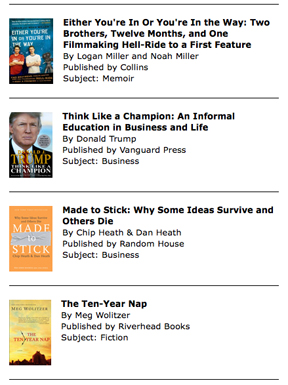 We develop websites, book trailers, podcasts, social media strategies, and extensive online publicity campaigns.
We develop websites, book trailers, podcasts, social media strategies, and extensive online publicity campaigns.
We have relationships with literally thousands of web editors and bloggers for both general interest and niche audiences. With these relationships, we pitch a book and its author to contribute reviews, “expert” features, pod and webcasts, email interviews, guest blogging, and content syndication.
We’re able to provide these websites with ready-to-use electronic content making it as simple as possible for them to update their sites. These types of features are the most effective form of marketing today. They happen faster and last longer than other types of media coverage, giving the buzz about a book not only a quick start but also longevity.
For example, we arranged for Suzanne Bates, author of Motivate Like a CEO: Communicate your Strategic Vision and Inspire People to Act! to blog for the Huffington Post on President Obama’s communication style.
And here’s an example of a plug in legendary columnist Army Archerd’s blog at Variety for author Adam Victor’s The Elvis Encyclopedia, which linked directly to an in-depth description of the book.
Once you’ve put together a plan, what do you expect authors to do on their own and how much direct assistance do you provide?
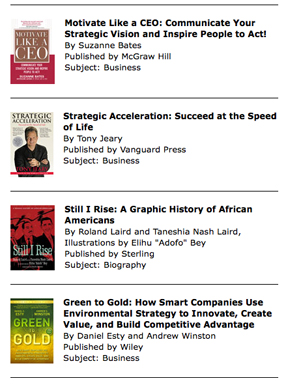 Authors hire us because they either don’t have the expertise to promote their book online or don’t have the time to do so effectively. We believe our job is to use the author’s time and resources to the best advantage. Many of our authors don’t want to blog regularly or spend hours making friends on Facebook; others love it and look forward to it.
Authors hire us because they either don’t have the expertise to promote their book online or don’t have the time to do so effectively. We believe our job is to use the author’s time and resources to the best advantage. Many of our authors don’t want to blog regularly or spend hours making friends on Facebook; others love it and look forward to it.
We look at the goals and availability of each author, and then advise them about the online tools best suited for their goals. For the publicity campaign, we handle the whole thing.
Authors are welcome to share ideas and sites with us and we’ll make sure we incorporate them into the campaign, but it is our job to find their audience online and promote their book. The best way for an author to help is to write op-ed pieces and timely articles for distribution and placement on the web.
How tech-savvy must a writer be, or do you take charge of all the technical aspects?
Authors don’t have to be tech-savvy at all, though it’s helpful for us to be able to communicate via email. We’re happy to help our clients navigate the options and priorities of web marketing. We believe strongly that we are a marketing and publicity firm and not a technology company.
What about author websites?
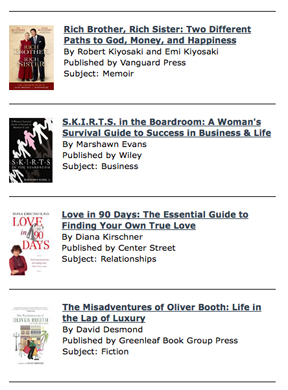 We design individual websites for our clients and they vary depending on each author’s goals, budget and needs. We develop these sites in-house, with our staff graphic designers and programmers. We have designed and still maintain a number of sites which you can view on our website portfolio.
We design individual websites for our clients and they vary depending on each author’s goals, budget and needs. We develop these sites in-house, with our staff graphic designers and programmers. We have designed and still maintain a number of sites which you can view on our website portfolio.
We’ve designed sites for many authors, including Mary Higgins Clark, Clive Cussler, Ram Charan, Sue Grafton, and others. Recently, we created this site for Logan and Noah Miller which has some interactive features including a video of the authors.
How do you measure the success of a web campaign?
This is an excellent question, without a clear-cut answer. It is difficult to quantify any publicity effort, even among traditional channels like television and print media. However, there are a few key advantages of promoting books on the web. Online features have longevity. They last a long time and show up on every Google search.
Buying a book is a click away, and building an author platform online is a lot less expensive and much more effective than using traditional methods like traveling across the country trying to arrange your own events, print and broadcast media.
What’s your approach for an unknown writer, as opposed to someone with a track record or at least beginning platform?
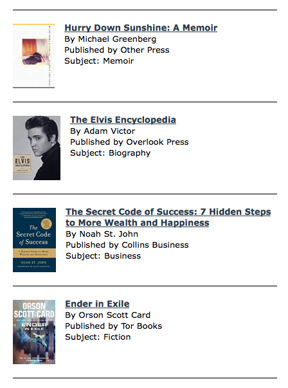 It certainly helps the campaign if an author has had a track record. Nevertheless, sometimes an unknown author is especially exciting for us when can help them break out, as we did with Dr. Arthur Agatston, the author of The South Beach Diet and Kim Edwards, who wrote The Memory Keeper’s Daughter.
It certainly helps the campaign if an author has had a track record. Nevertheless, sometimes an unknown author is especially exciting for us when can help them break out, as we did with Dr. Arthur Agatston, the author of The South Beach Diet and Kim Edwards, who wrote The Memory Keeper’s Daughter.
What do you think of video book trailers?
Just as we use articles and excerpts as content on various sites and blogs, videos can also be considered useful on sites that will accept them. The only concern would be whether it’s worth the investment. Will it sell books? Sites such as YouTube are really popular, but are so saturated that a book trailer can get lost in the crowd. Some people have mentioned using marketing support you could find reviews about websites such as brands-reviews.com/reviews/appsally to better understand what could help you stand out from the crowd? It is still a furiously competitive market place.
If you have a website, posting it there is a great way to connect with fans. But an author should not assume a video will automatically sell books and “go viral.”
Many authors have heard about the “virtual book tour.” What can you tell us about that?
Many people refer to a “virtual book tour” as something you do online for a week or two, moving around among websites and blogs. Each site features a little information, maybe a couple of interview questions; part of an excerpt; a raffle — and then points visitors to the next site with a suggestion to “tune in tomorrow for more.”
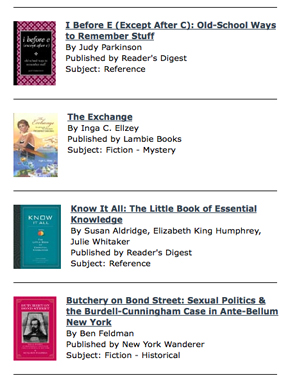 In my opinion, that approach of presenting partial information does a disservice to readers. It’s a tease that may not actually sell the book, because who knows if the reader will really come back tomorrow?
In my opinion, that approach of presenting partial information does a disservice to readers. It’s a tease that may not actually sell the book, because who knows if the reader will really come back tomorrow?
We take a different approach. During a two or three month campaign, we feature our authors on podcasts, and carefully place their book excerpts and articles for maximum effect. Each of these features is complete, and “makes the sale” right off the bat. They also help bolster the author’s search results on Google and build a comprehensive campaign that helps an author’s brand and platform to grow.
More authors seem to be taking charge of their own marketing. Are you seeing this too?
We’ve definitely noticed a trend in authors hiring us directly. What’s more, because our author-clients are committed to maximizing their exposure, we’ve seen tremendous growth in the more expensive three-month campaign option we offer – up more than 400 percent in the first quarter of 2009 over the same period last year.
We find that publishers with budget restrictions tend to choose the more affordable two-month campaign option.
Some of our current author-clients include Steve Farber, author of Greater Than Yourself; Kamran Pasha, author of Mother of the Believers; Elizabeth Flock, author of Sleepwalking in Daylight; Diana Kirschner, author of Love in 90 Days; Tony Wagner, author of The Global Achievement Gap and Laura Berman Fortgang, author of The Little Book on Meaning.
What do you charge for your services?
The cost for a campaign, which lasts for at least two months, ranges from $5,500 – $12,000. We hand pick our projects to be sure we can deliver the best possible results.
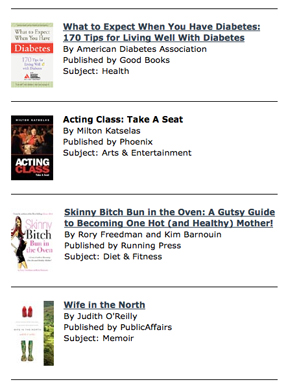 At this time, 60 percent of our clients are publishers and the rest are authors. We see that changing, however, as publishers cut back on their marketing budgets and more authors invest their own money to promote their book.
At this time, 60 percent of our clients are publishers and the rest are authors. We see that changing, however, as publishers cut back on their marketing budgets and more authors invest their own money to promote their book.
Do you offer services to self-published writers?
We don’t take on a self-published author unless the book has been picked up by a commercial publisher. We need to be sure that a book is accurate and reputable, and we rely on traditional publishing’s professional editing, design and manufacturing.
But things are changing rapidly. In the coming months we plan to explore self-publishing as we know the market is growing quickly.
How’s business in general?
Business is rather good. We had a slowdown last fall as some publishers went through a budget freeze, but so far this year they have more than made up for it.
 Authors and publishers know that their buyers are online, and with the shrinking print media, web publicity is the best way to reach them. It’s less expensive than advertising, book tours, and traditional publicity, and has proven to be very effective for selling books.
Authors and publishers know that their buyers are online, and with the shrinking print media, web publicity is the best way to reach them. It’s less expensive than advertising, book tours, and traditional publicity, and has proven to be very effective for selling books.
Authors who have spent years writing are not about to give up at publication. The weak economy is all the more reason to invest in cost-effective methods to promote their books.
Reach Fauzia Burke online at FSB Associates ____________________________________________________________________________
Alan’s Two Cents:
Right now the book business is very volatile, with big changes, shifts, new experiments every week. All the old bets are off and former approaches to marketing are giving way to more creative ventures. There are a lot of smart people in the book business out there trying to figure out how to survive in the current economy.
Please comment with your thoughts on web marketing for books, and your own experiences so far. Does it make sense to hire a consultant, or is this something you can do on your own?
The key to any of these online efforts is to target the right audiences for the book. I went to the San Francisco Writers Conference two years ago and editors and agents were encouraging writers to do blogs. Then, it was MySpace and Facebook. Now it’s Twitter.
As someone who transitioned from a career in web design and development to writing this just cracked me up. Tweeting for the sake of Tweeting only marginally raises your general author profile. That isn’t a bad thing but probably isn’t the most efficient use of your time (depending on where you are in the publishing/promotion process).
Shane in post #3 is on the right track with messageboards. You have to find where your target audience is online and approach them. If your book is about making the most of your retirement why in the world would even go on MySpace? Its users are mostly in high school. Meanwhile, if you’re writing a young adult novel set in Detroit, Michigan it might be worth finding out how many teens in Detroit are on MySpace or Facebook.
The “networks” and “fans of” pages on Facebook could be great audiences for writers who deal with specific topics, whether the topic is Martin Luther King, Jr.; low carb diets; or vampires. It’s easy to join the location-based networks or alumni groups or sign up as a fan of the people/events/topics related to what you write.
Real world fan clubs often have an online presence as well. The book I am writing is about the racial integration of pro football in 1946 (yep, the year *before* Jackie Robinson broke the color barrier in major league baseball). The Cleveland Browns figure prominently so I went online to find out about their fan clubs. There’s more than 100 clubs worldwide with more than 85,000 members! A group local to me (in SF) has more than 200 members. Can you imagine what an excerpt of my book in the umbrella group’s email newsletter could do for my book sales? I imagine a lot more than a promotion that goes out to a general audience of 500,000.
So, first think about where your primary, secondary, etc., audiences are online and target them with more of your time, energy, and money rather than trying to get people to come to your blog, etc. Note the link to my blog, ahem ;)
Thanks for that link, Rob!
I’m about to self-publish my first novel and though I’m still in the early stages of planning, the marketing aspect of it has been heavy on my mind since I started writing it. The great thing about web-marketing is that the cheaper avenues of advertising are still really abundant.
Messageboards are a great start because it costs nothing to post a link to your book in a relevant thread. Community sites like Myspace and Facebook are free as well, though the exposure is limited to the folks you’re attached to on the site. Try posting a comment on all of your friends’ pages with a link to your book. That way not only your freinds will see it but their friends will see it as well.
I have about ten blogs in mind that should get promo copies to review, which means we’re out of the free zone and in the cost-of -a-book zone. Still pretty low budget. I haven’t really investigated the territory much; those are just ten sites I already frequent.
Beyond this point, I’m really uncertain, and I can’t wait to read some anecdotes about paid advertising on bigger sites. I’m really interested in Amazon’s matching deal where your book is matched with another popular book on their page for $1000 a month. I’d like to know if anyone has used that and if they saw a bump in sales connected to it.
Alan,
Great blog post and a wonderful interview with Fauzia…she really knows her stuff and I recommend her services. You are right that now is the time for big change in the publishing industry. As publishers struggle, authors have more influence over their success than ever before. However, the right kind of strategy must be created. There is no “one-size-fits-all” plan that works for every book.
Jim, per your earlier comment, I understand your concern about being a first-time author on a limited budget. At WildFire Marketing, we’ve taught over 100 authors at all levels how to capture online exposure for their books, plus grow their platform through public speaking and direct contact with leaders. Our services range around $2,500 – $5,500, which fit today’s budget-conscious author. I invite you to take advantage of over 20 free book marketing articles at:
http://www.startawildfire.com/freeresources.html
Being a regular (meaning middle-class income) sort of family guy, who is an aspring author, I try to keep tabs on what is going on with online publishing. I wonder at how I can put my name out there and get recognition if/when I get published, or how I can get it out there to increase my chances of getting published. I would probably give up significant body parts to have a marketing campaign like the one mentioned above if I were published, but there’s no way, unless I had a pretty significant advance, that I could afford it. I’m guessing the vast majority of debut authors don’t see or have that kind of money, and most publisheres aren’t going to get behind them with that kind of upfront investment. This is the higher end of publishing to my way of thinking, and not something I would ever have available to me. I would like to see how to do similar things on a budget.
J Duncan